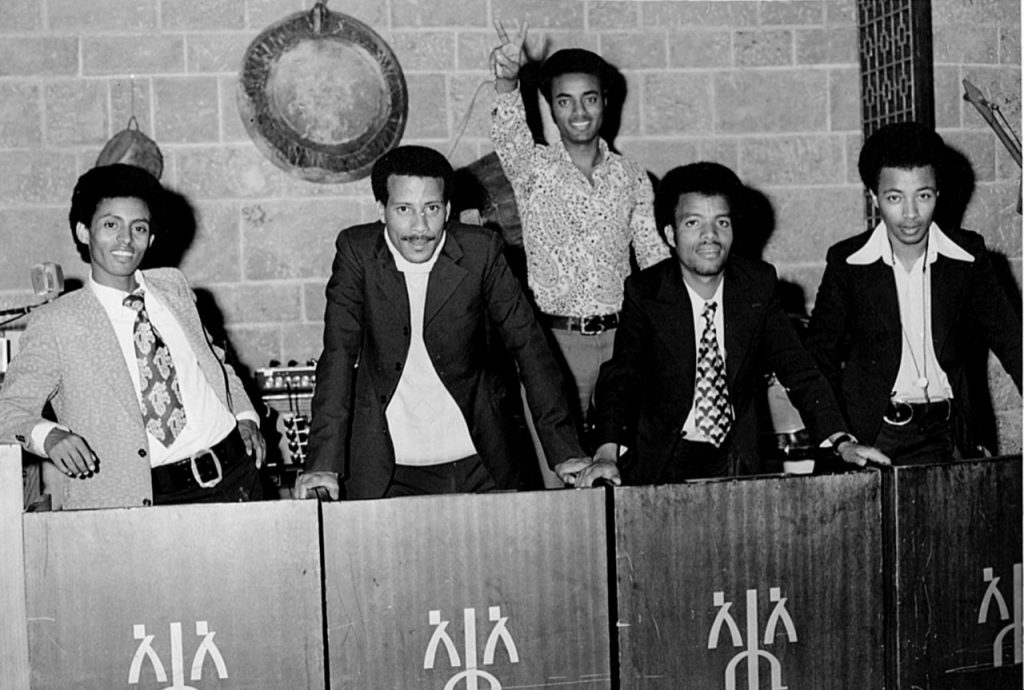
There are golden ages, and then there’s what comes after them. Hailu Mergia has enjoyed plenty of spillover illumination from the attention paid to Ethiopia’s golden age of popular music, which has been extensively documented by the Ethiopiques series of compilations and reissues. But his vintage recordings, including Tezeta, actually date from the years after, when the oppressive shroud of authoritarian dictatorship put the kibosh on the unbridled nightlife that Addis Ababa had enjoyed during the last days of Haile Selassie’s reign over Ethiopia. The tenor of these times exerted a strong shaping influence over the music heard on Tezeta, which was originally released in Ethiopia in 1975 and has now been rescued from virtual oblivion by Awesome Tapes From Africa.
Mergia is a keyboardist who made a steady living in Addis Ababa’s nightclubs during the 1960s and 1970s. During that time, modern instruments and records from around the world made their way into Ethiopia, a country with a rich music scene steeped in traditions that go back for centuries. The result was an irresistible mixture of Ethiopian forms and American soul sounds. The social strictures loosened as the monarchy’s control over daily life weakened, which resulted in a bustling club scene. But the bands playing in them were sponsored by the army or venues; most musicians didn’t even own their own instruments.
In the early 1970s, Mergia and a few other musicians struck out for independence. Adopting the name the Walias Band, they bought their own instruments, opened their own music shop and released their own tapes. This meant they had an incremental element of autonomy when the Derg junta took over in 1974. While the dictatorship imposed a curfew, the group was able to maintain a schedule by working in hotels, where the customers didn’t have to worry about getting home. The Walias Band was able to persevere until 1981, when they finally got a chance to tour the U.S.; they promptly disbanded after half the group refused to go home. Mergia settled into life in Washington, D.C. (If you’ve ever been picked up at Dulles Airport by a dignified older gentleman who keeps a keyboard in his cab to play between fares, it might’ve been Mergia.)
The Walias Band’s hotel jobs often involved backing singers, but on recordings like Tezeta (their second cassette), they were purely instrumental. Songs with no vocals didn’t have a big place in Ethiopian popular music, but when there’s no singing, there isn’t much for the censors to censor. Mergia’s organ filled the space vacated by the singers, replacing vocal melodies with undulating, pentatonic lines. If you already have a few of those Ethiopiques compilations, tunes like “Tezeta,” “Nefas New Zemedie” and “Zengadyw Dereku” will sound quite familiar to you, and Mergia’s skill at duplicating the expressive ornamentation of Amharic-language singing with quick trills and strategically placed sustained notes will be immediately apparent.
But this music isn’t just for Afropop nerds. The Walias Band’s punchy horns, pillowy electric piano and trebly electric guitar will hit the same spot as your favorite Jimmy Cliff and Memphis soul records. The unhurried lope of their grooves, which are rooted in the same tradition as the singing, might be less familiar, but that just makes them eminent earworm material. Soulful and indelibly catchy, this is music equally suited to late-night, solitary reveries and to wowing your friends with great, unknown-to-them jams at a backyard picnic. Sourced from a cassette that spent decades in a Dutch tourist’s collection, the music has been nicely cleaned up so the tunes, not the hiss, predominate, permitting the warmth of these sounds from the sunset of Ethiopia’s golden age to radiate unfiltered.
—Bill Meyer






